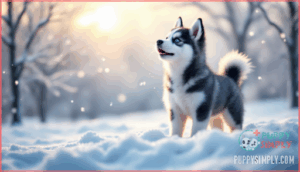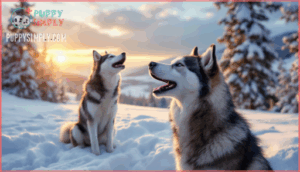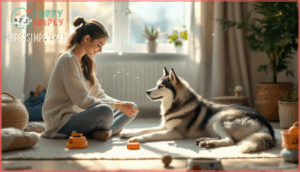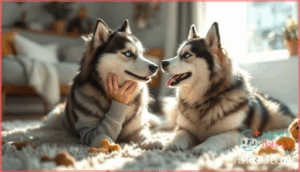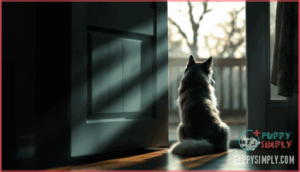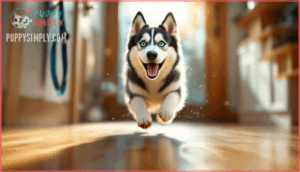This site is supported by our readers. We may earn a commission, at no cost to you, if you purchase through links.
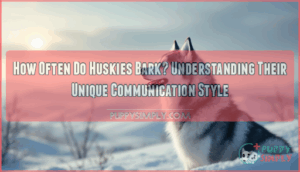
This quirk isn’t random—it’s rooted in their ancestral pack habits and how they evolved to communicate across vast Arctic distances. While traditional barking happens occasionally, huskies rely on a completely different vocal toolkit to express themselves.
Understanding when and why your husky does bark reveals important clues about their emotional state and helps you distinguish normal communication from signs of anxiety or stress.
Table Of Contents
- Key Takeaways
- Why Don’t Huskies Bark?
- Huskies Communicate Differently
- When Do Husky Puppies Bark?
- Reasons Some Huskies Bark More
- Managing Excessive Husky Barking
- Meanings Behind Husky Vocalizations
- Frequently Asked Questions (FAQs)
- Do Siberian Huskies bark?
- Why do Huskies bark so much?
- What does a Husky bark sound like?
- Do husky bark at strangers?
- Do Siberian Huskies whin or Howl?
- Do Siberian Husky shed a lot?
- Do some husky bloodlines bark more than others?
- Is my husky’s barking disruptive to my neighbors?
- How can I train my husky puppy not to bark?
- Why has my senior husky started barking a lot lately?
- Conclusion
Key Takeaways
- Huskies rarely bark because their ancestral pack dynamics and Arctic heritage prioritized howling for long-distance communication over territorial barking, making their vocal toolkit fundamentally different from guard dog breeds.
- When huskies do bark, it’s typically triggered by specific needs like anxiety, boredom, excitement, or unmet exercise requirements rather than territorial instincts, with 17% showing separation anxiety and 34% vocalizing from boredom.
- Huskies communicate primarily through howling, "talking," whining, and body language to express emotions and needs, creating a nuanced canine language system that requires owners to decode vocal patterns alongside physical cues.
- Managing excessive barking requires identifying triggers through observation, providing at least one hour of daily exercise, using positive reinforcement training, and addressing underlying causes like mental stimulation needs rather than suppressing natural vocalization entirely.
Why Don’t Huskies Bark?
If you’ve ever wondered why Huskies rarely bark, you’re not alone. Their actions are shaped by a few key traits that set them apart from other breeds.
Let’s look at what makes Huskies so different in terms of vocalizing.
Territorial Nature
You’ll rarely see a Husky bark for Space Defense or Resource Guarding. Unlike true guard dogs, Huskies don’t show the territorial conduct you might expect. Territorial Marking or Boundary Setting just isn’t in their DNA.
Even with their wolf ancestors, these dogs rely less on protective conduct or guarding conduct, instead fitting into Pack Dynamics over territory.
Pack Behavior
Just like their wild cousins, huskies naturally lean into group life, using howls and body language to keep the whole pack in sync. It’s all about Pack Dynamics and Social Hierarchy—every dog knows its place and role. Instead of barking like a guard dog, huskies rely on Canine Interaction that revolves around:
Huskies communicate through pack dynamics and social hierarchy, relying on howls and body language rather than territorial barking
- Group Communication through howling, not territorial barking
- Subtle body language to reinforce Leader Roles
- Constant signals for harmony among pack mates
This helps explain why guarding conduct rarely surfaces.
Pet-Owner Communication
If you’ve ever wondered how your husky tries to “talk” to you at home, you’ll notice it’s more about quirky gestures and expressive looks than anything you’d expect from a typical barking breed. Huskies lean on Canine Body Language and Husky vocalizations—think head tilts, tail wags, and cuddle invitations. These subtle Pet Dialogue Systems build strong Owner Husky Bonding.
For example, you might see:
- Playful jumping for excitement
- Gentle nudging for attention
- Soft “wooing” sounds to communicate needs
- Quiet whines signaling confusion or affection
Vocal Cue Training can help you decode these unique Husky communication methods.
Huskies Communicate Differently
Instead of barking at every sound or stranger, huskies have developed their own language—one that’s closer to a wolf’s howl than a typical dog’s bark. These vocal behavioral patterns reflect their pack dynamics heritage. Huskies howl to connect over distances, while husky whining and "talking" manage close-range canine communication. Their husky vocalizations include yips, warbles, and melodic conversations that reveal emotions and needs.
| Vocalization Type | Purpose |
|---|---|
| Howling | Long-distance pack communication and bonding |
| Whining/Talking | Direct interaction with owners, expressing needs |
| Body Language | Ear position, tail movement, eye contact for nuanced messages |
Understanding these husky communication methods helps you respond appropriately. Watch their ears, tail, and posture alongside their sounds. This canine language system creates deeper connections and helps meet their dog socialization needs effectively.
When Do Husky Puppies Bark?
Most husky puppies don’t bark often—in fact, they usually howl, whine, or "talk" before they ever discover barking. These vocalization patterns develop during canine development as puppies explore their husky vocal tendencies.
Around 8-16 weeks, during puppy socialization, you might hear occasional barks during play or excitement—barking triggers like toys or other puppies can prompt these sounds. However, their husky temperament naturally favors howling over barking.
If your husky puppy suddenly barks frequently, watch for anxiety or attention-seeking actions. Understanding husky barking habits early helps with husky puppy care and prevents misreading their reasons huskies bark when they actually need something else entirely.
Reasons Some Huskies Bark More
While most huskies stick to howling and "talking," some bark more than others. A few factors can turn even the quietest husky into a more vocal barker.
Let’s look at what might be causing your husky to bark more frequently.
Anxiety or Boredom
About 17% of huskies bark more when separation anxiety sets in, while another 34% vocalize from boredom. Stress triggers like sudden routine changes or lack of exercise can spike barking by up to 27%. Watch for these boredom signs and anxiety causes:
- Pacing or destructive chewing when left alone
- Repetitive barking during inactive periods
- Restlessness after less than an hour of daily activity
- Excessive barking triggered by environmental factors like thunderstorms
Combat these issues with mental stimulation—puzzle toys, scent games, and at least two hours of daily exercise dramatically reduce attention-seeking and excessive barking in under-stimulated huskies. Understanding their genetic vocal traits is essential for effective communication and addressing barking issues.
Communication Needs
Around 22% of huskies bark more because they’re trying to tell you something important. Their vocal conduct isn’t random—it’s purposeful canine language designed to get your attention. Huskies bark when communication styles between you and your dog haven’t quite clicked yet. Understanding these vocalization patterns helps you respond better to their social interaction needs.
About 29% of huskies learn that specific vocalizations earn owner response and rewards, reinforcing certain canine conduct patterns over time.
- Mealtime reminders: Barking signals hunger or thirst
- Potty emergencies: Your husky needs outside access now
- Play invitations: Excitement-driven vocalizations mean "let’s go!
Managing Excessive Husky Barking
If your husky’s barking is becoming a problem, the good news is that you can address it with the right approach and a little patience. Start by identifying what’s triggering the barking—keep a simple log noting when and where it happens. Reasons for husky barking often include boredom, anxiety, or unmet exercise needs.
Once you spot the pattern, use training techniques focused on positive reinforcement. Reward your husky when they’re quiet in situations that usually trigger barking. That’s why vocalization control starts with catching good conduct early.
Meeting their exercise needs is vital for bark reduction. A tired husky is a quiet husky—aim for at least an hour of daily activity. Add puzzle toys and mental challenges to prevent boredom.
For calming methods, try desensitization to triggers gradually. If managing husky barking proves challenging despite your efforts, consult a certified trainer who understands reducing excessive barking in working breeds.
Meanings Behind Husky Vocalizations
Huskies don’t just make noise—they’re trying to tell you something specific each time they vocalize. Different sounds mean different things, and learning to read these signals helps you understand what your dog needs.
Let’s break down three common vocalizations and what they’re communicating.
Talking and Affection
When your Husky "talks" to you, it’s more than just noise—it’s vocal bonding in action. Over 60% of owners report their Huskies mimicking vowel patterns during playful interactions, showing canine empathy and an affectionate manner.
This emotional expression is how these vocal breed members communicate love and strengthen your connection. Huskies talk because they’re hardwired for pack communication, and you’re part of their family. They often use unique "woo-woo" sounds to communicate.
Separation Anxiety Howling
While your Husky’s affectionate "talking" signals connection, separation anxiety howling tells a different story. Over 90% of owners link howling to loneliness—your dog’s distress call when you’re not around. These home alone sounds stem from their pack instincts; being isolated contradicts everything they know about belonging.
To manage anxiety howl triggers and prevent destructive howling, try these calming techniques:
- Establish consistent owner return cues so departures feel less permanent
- Provide puzzle toys that challenge their minds before you leave
- Practice short absences to build confidence gradually
- Create a calm routine that signals you’ll always come back
Recognizing this vocalization as anxiety helps you respond with compassion.
Excitement Barking
Unlike separation anxiety’s distressing howl, excitement barking shows pure joy. Around 45% of all Huskies’ barking events happen before walks, meals, or play—mealtime excitement and pre-walk barks are textbook stimuli responses. Your dog’s playtime anticipation or greeting barking when you arrive home reflects emotional overflow, not a communication problem.
These vocalizations spike because Huskies channel energy into sound. Redirect that enthusiasm through calm-before-storm routines: sit-stays before leashing up, patience games before food bowls. You’re teaching emotional regulation, not silencing happiness.
Frequently Asked Questions (FAQs)
Do Siberian Huskies bark?
Yes, Siberian Huskies can bark—they’re physically capable—but barking isn’t typical husky temperament. Their genetic predisposition favors howling and vocal variety over standard barking habits, making Siberian Husky barking habits distinctly rare compared to other breeds.
Why do Huskies bark so much?
Most Huskies don’t actually bark much at all—but when they do, it’s usually for specific reasons like attention seeking, play initiation, distress signals, or warning barks.
Their vocalization style differs from typical canine conduct, favoring howls over barking.
What does a Husky bark sound like?
When huskies do bark, the sound is usually sharp and higher-pitched compared to howling. Bark acoustics reveal individual variations in vocal range—some huskies produce quick, staccato yips while others emit deeper woofs, though breed comparisons show their barking remains less frequent and forceful than territorial breeds.
Do husky bark at strangers?
Not usually. Huskies lack the protective instincts and territorial conduct that make other breeds bark at strangers.
They’re too friendly to be guard dogs—socialization and breed temperament mean they’re more likely to greet newcomers with curiosity than suspicion.
Do Siberian Huskies whin or Howl?
Absolutely. This vocal breed uses both whining and howling as primary Canine Communication methods. Whining conduct usually signals immediate needs—attention, food, or anxiety—while Howling Techniques serve long-distance pack communication, explaining why Huskies howl frequently and rarely bark.
Do Siberian Husky shed a lot?
Double coats mean double trouble—Siberian Huskies shed heavily, especially during shedding season.
Regular coat maintenance and grooming tips are essential for fur management and shed control to keep Husky shedding under control year-round.
Do some husky bloodlines bark more than others?
Bloodline differences in barking tendencies aren’t well-documented among huskies. While genetic factors and hereditary traits influence husky breed characteristics, most lineages share low barking tendency.
Your puppy’s upbringing and training matter far more than lineage influence when addressing reasons for husky barking and developing healthy communication patterns.
Is my husky’s barking disruptive to my neighbors?
Most noise complaints stem from persistent sounds, not rare events. If your husky barks occasionally, your neighbors likely won’t notice.
However, excessive barking—especially early morning or late evening—can disrupt community harmony. Monitor patterns and consider sound reduction strategies or barking solutions if concerns arise.
How can I train my husky puppy not to bark?
Training a husky puppy not to bark entirely goes against their natural instincts. Instead, focus on positive reinforcement and puppy socialization to teach the ‘quiet command.’ Use redirected attention and calming techniques when excitement builds. Regular exercise reduces barking in huskies markedly.
Training techniques for bark control work best when addressing underlying anxiety through consistent husky mannerisms and training routines.
Why has my senior husky started barking a lot lately?
Increased barking in a senior husky—especially when huskies don’t bark much naturally—often signals health issues, cognitive decline, or age-related changes. Schedule a vet exam to rule out pain or discomfort.
Environmental triggers and separation anxiety in huskies can worsen with age, so provide extra companionship and mental enrichment.
Conclusion
Think of your husky’s vocal repertoire like a well-tuned instrument—barking is just one note in a much richer symphony. By now, you understand how often huskies bark and why their communication runs deeper than simple yes-or-no alerts.
When you recognize the difference between a worried howl and playful chatter, you’re not just hearing noise—you’re tuning into their emotional world. That awareness transforms frustration into connection and helps you respond with the right support at the right time.


